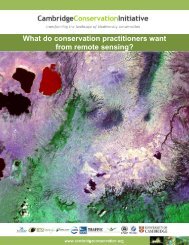CONSERVING BIODIVERSITY & DELIVERING ECOSYSTEM SERVICES
conserving biodiversity & delivering ecosystem services
conserving biodiversity & delivering ecosystem services
You also want an ePaper? Increase the reach of your titles
YUMPU automatically turns print PDFs into web optimized ePapers that Google loves.
Nepal is rich in biodiversity and ecosystem services due to its diverse topography, landscapes and<br />
climatic variations. The economic, health and social benefits that we derive from our ecosystem<br />
services are vital for the well-being of many Nepalis. This is particularly so for poor communities<br />
whose livelihoods depend on natural habitats.<br />
The Government has long recognised the importance of ecosystem services and, since the early<br />
1970s, has developed national laws, policies and plans for the sustainable conservation of its natural<br />
resources, and established a network of Protected Areas and Community Forests.<br />
Despite these efforts, there has been a big decline in biodiversity as a result of human pressures and<br />
encroachment. It is clear that a more integrated approach to ecosystem management is needed, so<br />
that more effective decisions can be made to reduce pressures, conserve biodiversity and enhance<br />
the benefits that people receive from nature.<br />
Our local and national decision-makers need to be informed about the relevance of biodiversity and<br />
ecosystem services when considering the management of our protected area system, natural habitats<br />
and water resources, the expansion of our tourism industry and plans for climate change adaptation.<br />
This report is an important milestone in improving our understanding of ecosystem services in Nepal,<br />
based on an assessment of the ecosystem services at 27 Important Bird Areas, spread across the<br />
country. It is a ‘must read’ report for decision-makers at all levels as it explains the concepts and<br />
results clearly, and provides interpretation and recommendations across a number of policy sectors<br />
and detailed case studies for four key sites.<br />
I am confident that we can use this work for better policy formulation and site management,<br />
improving the livelihoods of people, meeting Nepal’s international commitments to biodiversity<br />
conservation and climate change mitigation and adaptation, and ensuring a more sustainable future.<br />
Dr Krishna Chandra Paudel<br />
Secretary<br />
Ministry of Forests and Soil Conservation




